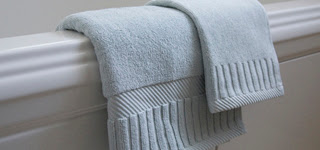So, here's just a little breakdown of the differences in towels and the different materials they are comprised of... First of all the two most widely known are the Egyptian and the Turkish cotton towels... There are many great qualities to speak of for both...
- Both Egyptian and Turkish cotton are long staple--also known as long fiber--cotton. Long staple fiber is narrower in diameter, which means more threads can fit into the cloth per square inch
- Egyptian cotton is extremely absorbent while Turkish cotton sacrifices a bit of absorbency for long-term staple integrity. More threads per square inch (mentioned above) means that the fabric is lightweight and can breathe well.
- Egyptian cotton is extremely soft, making it a favorite in the textile industry when softness is needed, such as for bathrobes. Turkish cotton is also incredibly soft, and it possesses a natural sheen that cannot be matched by other cottons without a lot of processing.
So now there's the newest "green" textile being used, which is bamboo...
- Bamboo grows faster than any other plant and requires no pesticides or fertilizers. It is an adaptable plant and can grow under almost any water and soil conditions. Cotton can be grown organically (i.e., with no chemicals) or fertilized, sprayed with pesticides and bleached. Cotton plants require fertile soil and constant irrigation. Both plants grow so quickly and well that they're considered to be renewable resources.
- Manufacturers of bamboo towels claim that they are more absorbent than towels made of cotton and that they are antimicrobial. While it's true that raw bamboo displays these characteristics, once it has been processed it is no different from rayon. Manufacturers also claim that bamboo towels are softer than cotton towels, but in a Wall Street Journal test, testers' preferences depended on the weave and thickness of the towel more than on the fabric source. Some bamboo towel manufacturers also claim that their products are biodegradable, which is false.
Also when purchasing cotton bath towels, make sure they aren't cotton/poly blends. The polyester will make these towels less absorbent. Also, avoid cotton towels labeled velour. This just means that the loops created during the weaving process were cropped. This makes the towels smooth but causes the water to bead on the surface, making the towel feel wet all the time.
 |
| I think Marcus is in Egyptian cotton... What do you think? |
So class, what have we learned? You're better off using paper towels to dry off with.... NO! Just kidding. It's all about personal preferences at the end of the day, and where you live. My family is all in Hawaii, which is where I am right now. My mom is on a higher elevation of the island, so things do stay damp, so going Turkish would probably be the way to go. If you were in New Mexico though, where the humidity levels are near zero most of the time, Egyptian could be the way to go, since the fibers will dry out a little quicker.
When buying, please also don't be moved by the brand names of the towels... I can tell you that despite being on the top of their game with fashion, brands like Calvin Klein, Donna Karan, and Ralph Lauren haven't quite perfected the formula for the perfect towel. The well known Charisma, Fieldcrest, and Wamsutta brands are probably still your best bets for value, comfort and absorbency.
 |
| Charisma is good enough for Gabriel... I think that's good enough for anyone with a pulse! |




I need to get Turkish towels. Do they sell them at Bed, Bath & Beyond? ;-)
ReplyDelete